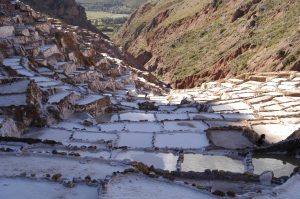The Center for Material Culture Studies (CMCS) invites applications from UD faculty and graduate students for the 2023–2024 Thing Tank research forum, Subaltern Matters: Knowledges and Technologies from Below. Thing Tank supports the research and professional development of graduate students and faculty by creating a space for sustained intellectual exchange on topics related to the study of material culture.
Each year, CMCS appoints appoints 4 Faculty Fellows and 6 Graduate Fellows as part of a year-long cohort. Together, they collaborate to explore a major topic in material culture studies. Fellows workshop writing-in-progress, attend biannual public talks by prominent guest lecturers, and participate in field visits to regional collections or sites. (See below for more details and how to apply.)
The forum topic for 2023–2024, Subaltern Matters: Knowledge and Technologies from Below, considers the intersections of material culture studies and subaltern studies. Conventional scholarship has often presented globalization and capitalist expansion as unilateral processes in which subjugated communities provide precious resources and inexpensive labor to dominant powers. Rarely are the subaltern knowledges about materials and technologies that accompany such extractive practices recognized as crucial components in these asymmetrical exchanges. But the rise of world powers has always depended precisely on such knowledges and practices, despite a general disavowal of this dependence. This Thing Tank will thus focus on subaltern materialities and technologies to explore not only subaltern agency in material culture production, but also the ways in which local material cultures and technologies, as well as those mobilized by forced migrations, have influenced past historical developments, and have important bearing on present and future opportunities. Through lectures, roundtable discussions, and workshops, Thing Tank members are invited to investigate a variety of topics, including but not limited to:
- material cultures and technologies in the Global South
- materialities and technologies of the African Diaspora
- roles of Indigenous material cultures and technologies in settler colonialism processes
- subaltern contributions and responses to foreign extractivist practices
- relocation, assimilation and adaptation of subaltern material knowledges and technologies to other world regions
Through workshops, lectures, and site visits, participants in Thing Tank will explore subaltern matters from various disciplinary angles. We will consider how to center subaltern expertise and praxes that have been historically marginalized or erased from material culture studies. How can we bring the methods of material culture studies to bear on questions of asymmetrical power and the forms of agency that spring up in its wake? We invite a diversity of perspectives to consider fundamental questions about the material knowledges and technologies that arise and flourish “from below.”
Topic Director: Mónica Domínguez Torres (Professor, Art History)
CMCS Thing Tank Graduate Fellows
CMCS will select six advanced Graduate Fellows in the humanities and social sciences (MA or PhD) for the 2023–2024 Annual Research Forum. Each student fellow will receive a $500 research stipend and become a member of the Thing Tank’s cohort and forum. Students should be conducting thesis or dissertation research related to the Center’s theme for the year in which the award is granted. Fellows are required to attend the Thing Tank Research Forum, held Tuesdays from 12:45–2:00pm* during the academic year, and present their work at one of the sessions. Seminar members also include Faculty Fellows and the CMCS directors. *Interested applicants are advised to check well ahead with their department(s) to avoid conflicts with class schedules and other obligations.
CMCS Thing Tank Faculty Fellows
CMCS will select four Faculty Fellows to participate in the 2023–2024 Annual Research Forum. Applicants must be full-time UD faculty and CMCS affiliated members. Each Faculty Fellow will receive up to $1000 in research support and become a member of the Thing Tank’s cohort and forum. Applicants should be conducting research and/or developing and teaching courses related to the Center’s theme for the year in which the award is granted. Faculty Fellows are required to attend the Thing Tank Research Seminar, held Tuesdays from 12:45–2:00pm* during the academic year, present their work at one of the sessions, and serve as interlocutors and mentors for the Graduate Fellows. *Interested applicants are advised to check well ahead with their department(s) to avoid conflicts with class schedules and other obligations.
TO APPLY
Please submit the following materials as a single PDF via email to materialculture@udel.edu. The application deadline is April 1, 2023. Applicants can expect notification from CMCS in early May.
Graduate Student Applicants:
- Project Abstract and Application Letter (1250 words maximum)
- Please begin with a title and short abstract of your project (250 words maximum).
- The application letter (1000 words maximum) should clearly articulate how your research pertains to the theme of subaltern matters and describe projected outcomes of your participation in the seminar (e.g., advancing an article, dissertation, thesis, collaborative project, or other research initiative).
- Name and contact information for one faculty reference who can support your application
- A short, up-to-date CV (no more than 2 pages)
Faculty Applicants:
- Project Abstract and Application Letter (1250 words maximum)
- Please begin with a title and short abstract of your project (250 words maximum).
- The application letter (1000 words maximum) should clearly articulate how your research and/or teaching pertains to the theme of subaltern matters and describe projected outcomes of your participation in the seminar (e.g., advancing an article, book project, collaborative project, pedagogical undertaking, or other research initiative).
- A short, up-to-date CV (no more than 2 pages)




